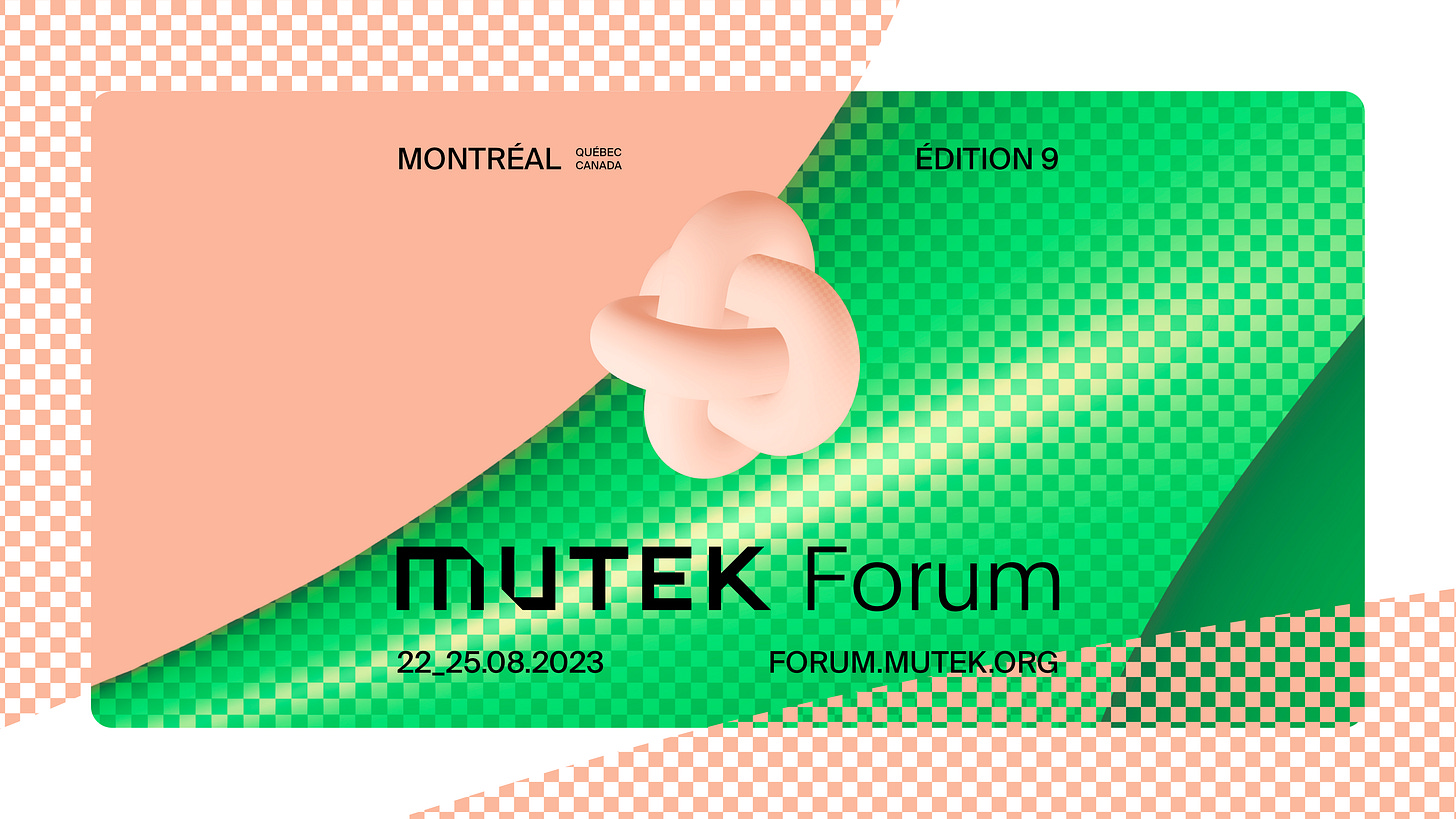✘ MUSIC x MUTEK - a collaborative exploration of artists' agency in new tech
And: Introducing Lifestyle; BMI questioned by songwriters on profitability; On ticket flipping and Taylor Swift
Today is the start of the MUTEK festival in Montréal, a yearly recurring festival and conference around music, technology, and art. This year, MUSIC x is a partner of the festival with the aim to explore the important role that artists have to play in the development of new technologies. It’s a topic I also touched upon in the aftermath of last year’s MUTEK festival after I spoke to Lola Baraldi, coordinator for digital projects and sustainability partnerships at the festival, and Line Katcho, who released her first work through VR at last year’s MUTEK. Back then I wrote:
“When I say that artists have a responsibility to engage with new tools and technologies, the expectation is experimentation. Art rarely does what you want it to do and artists are already pulled in many different directions. Properly engaging with new tools requires having the set up to do so.”
It’s at places like MUTEK that artists find that set up. What I’d like to know is how many artists find these places and how many of these are available. In order to find out, I’d like to request all of you to fill out a very short survey in relation to this. I’ll use the answers in an article I’ll publish to round of the MUTEK take-over of MUSIC x.
From artist-led experimentation I’d like to take the step to world-building and world-running. Artists have the ideas that can manifest worlds, but it’s impossible for them to create art, build a world and run it. What are the visions we need to help create the practical infrastructure required to create sustainable artistic worlds? That’s something we’ll explore in MUSIC x over the course of the next couple of weeks. You’ll find four guest contributions from participants of MUTEK within this newsletter, each one a speaker at the Forum - the conference section of the festival.
“The Forum invites those curious about the possibilities of art and technology to think critically about our digital present and futures, facilitating discussions and new perspectives that ultimately drive culture at large.” (Sarah McKenzie, creative director MUTEK Forum)
The first contribution comes this Thursday, followed by three more on each following Tuesday. Keep an eye on your inbox for these.
LINKS
🧳 Introducing Lifestyle (Daisy Alioto)
“Objects themselves are going through a bit of an identity crisis in the sense that images of objects have replaced objects in the digital hierarchy. And now, with the acceleration of AI, generated images threaten to replace those.”
✘ Definitely also read the whole piece, which Daisy originally published in 2020, but this new introduction frames our world and what’s changed for the author in the last couple of years. There’s always change, but tracking the long history of these changes helps us understand our current situation better. For Daisy, a lot surrounds the idea of storage, how we use it and what technologies it involves.
♭ Songwriter groups demand information about a newly for-profit BMI’s plans and possible sale (Chris Cooke)
“The letter sought clarification on BMI’s current profitability and the extent to which the introduction of a profit margin would impact on the fees and commissions the society charges on the royalties it collects for its member writers and publishers. It also wanted to know who would benefit from the profits of any sale of BMI and what impact a new owner might have on the running of the society moving forward.”
✘ The BMI’s CEO didn’t give clear answers, but this go to show how precarious the copyright world is. On the one hand, you have monopolies in most countries when it comes to royalty collections. On the other hand, you have an example of what it could mean to have market drivers involved. Tread carefully.
🎟️ What fans need to know about ticket flipping for Taylor Swift’s Toronto leg of tour (Dorcas Marfo)
“I think where people would appreciate more transparency is where does the money go from the surcharges on, for instance, that $2,800 ticket? Often the surcharges are a percentage of what that ticket costs so that's creating a pool of money that will get distributed.”
Catherine Moore, professor of music technology and digital media at the University of Toronto
✘ Some very salient points in this interview from Catherine and most of them help explain why NFTs are an excellent way to prevent exorbitant secondary markets, keep control with the artists and their teams, and provide transparency of transactions.
MUSIC
One of the upcoming guest contributors is Stefana Fratila, who made this amazing album a few years ago where she asked: “If each planet in our solar system were a different room, what would each room sound like?” She’ll talk about how she works in her own words, but for now, I already give you her music.




